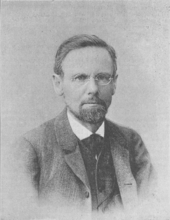The village beauties
Die Dorfschöne is a short story by the Austrian writer Peter Rosegger , which appeared in April and May 1882 in the Berlin monthly Deutsche Revue .
content
The action runs from autumn 1876 to July 1878 in Styria ; more precisely in the vicinity of Lahndorf. The beautiful village is called Kunigunde Pachner, Kundl, who was born there in 1860. After Kundl lost his mother at an early age, her father Zenz, a master eater in Rantenbach, was able to win the Höllerbauer in Lahndorf as the child's foster father. From now on Lahndorf remains Kundl's place of residence. The beauty works - with interruptions - as a maid in the cowshed of the Höllerbauers.
In October 1877, the small Schleider-Micherle stole the sackcloth with the cash in it from the market in Marein . The Micherle lives in a house with his parents in Lahndorf. Weeks later, Micherle calls in the cowshed and proposes to the maid. The young man is a dwarf, but Kundl of normal stature is still not averse. But there are the apples and pears that we brought with us. Kundl recognizes her sackcloth in which the “groom” carried the tasty fruit into the cowshed. Kundl demands her money back. Micherle can't pay and later gives the beloved junk. On January 12, 1878, the Höllenbauer intervened; enters his cowshed and forbids the constant fooling around his foster child with the man.
Kundl runs away in the middle of winter. No Lahndorfer knows Kundl's whereabouts. Micherle, dressed as a peddler, is looking for the bride. Vain. But Kundl's father, Zenz, finds the daughter as a waitress in a street tavern. The "waitress" moves on. On March 3, 1878, an anonymous letter was sent to the Lahndorf municipal office. Therein Graz reported as Kundls whereabouts. The letter writer Kundl had not fled to Graz, but from Lahndorf, in the opposite direction. This time the persistent Micherle is more successful in his search than the first time; finds the "bride" in the abandoned hut of a charcoal burner .
The young couple want to get married. The pastor of Frauenberg does not play along because of certain formalities regarding the documents to be presented. With a heavy heart, both those willing to marry turn to the Lahndorfer pastor. With a wink, he shows understanding for the sinful couple's willingness to marry.
Turning to the weather, as women are, Kundl suddenly doesn't want a peddler for a man. She wants someone who is always at home. Then the groom's pattern intervenes. The military want to take him despite his height; think: "He's not big ... But a firm bum." To their regret, the commission has to refrain from providing this, because the young man is the only child to take care of the economy of his frail parents. Nothing stands in the way of marriage. On a fine day in May 1878, the young couple married at 11:20 a.m. After the wedding reception at home, the newlyweds put down all the utensils they borrowed. Then the wife shows the husband that sackcloth with the reference: "... now the penalty period is increasing." It also happens. On Pentecost Saturday, the couple takes part in the Lahndorfer procession to Maria-Zell . The Micherle has to carry its Kundl up the mountain in parts. The way back leads over the Seeberg , the archducal castle Brandhof , the place Wegscheid and Kapfenberg to Lahndorf.
On July 13, 1878 the forest of the Adlerwirt burned down. Micherle, who wants to settle a financial debt with the forest owner, throws himself into the flames, warned by the locals, and perishes in it.
expenditure
- The village beauties . A story by PK Rosegger. In: German Review . tape 7.2 . Otto Janke, Berlin 1882, p. 38-55, 184-206 ( archive.org ).
- The village beauties . In: Peter Rosegger: The book of novels. Third volume, L. Staackmann. Leipzig 1916, pp. 5-65.
Remarks
- ↑ Maybe Rosegger means Landorf, a district of Mettersdorf am Saßbach .
- ↑ In Carinthia there is a community of Ranten am Rantenbach .
